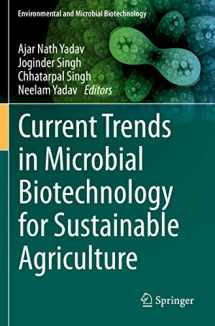
Current Trends in Microbial Biotechnology for Sustainable Agriculture (Environmental and Microbial Biotechnology)
Book details
Summary
Description
Product Description Microbial biotechnology is an emerging field with applications in a broad range of sectors involving food security, human nutrition, plant protection and overall basic research in the agricultural sciences. The environment has been sustaining the burden of mankind from time immemorial, and our indiscriminate use of its resources has led to the degradation of the climate, loss of soil fertility, and the need for sustainable strategies. The major focus in the coming decades will be on achieving a green and clean environment by utilizing soil and plant-associated beneficial microbial communities. Plant-microbe interactions include the association of microbes with plant systems: epiphytic, endophytic and rhizospheric. The microbes associated with plant ecosystems play an important role in plant growth, development, and soil health. Moreover, soil and plant microbiomes help to promote plant growth, either directly or indirectly by means of plant growth-promoting mechanisms, e.g. the release of plant growth regulators; solubilization of phosphorus, potassium and zinc; biological nitrogen fixation; or by producing siderophores, ammonia, HCN and other secondary metabolites. These beneficial microbial communities represent a novel and promising solution for agro-environmental sustainability by providing biofertilizers, bioprotectants, and biostimulants, in addition to mitigating various types of abiotic stress in plants. This book focuses on plant-microbe interactions; the biodiversity of soil and plant microbiomes; and their role in plant growth and soil health. Accordingly, it will be immensely useful to readers working in the biological sciences, especially microbiologists, biochemists and microbial biotechnologists. From the Back Cover Microbial biotechnology is an emerging field with applications in a broad range of sectors involving food security, human nutrition, plant protection and overall basic research in the agricultural sciences. The environment has been sustaining the burden of mankind from time immemorial, and our indiscriminate use of its resources has led to the degradation of the climate, loss of soil fertility, and the need for sustainable strategies. The major focus in the coming decades will be on achieving a green and clean environment by utilizing soil and plant-associated beneficial microbial communities. Plant-microbe interactions include the association of microbes with plant systems: epiphytic, endophytic and rhizospheric. The microbes associated with plant ecosystems play an important role in plant growth, development, and soil health. Moreover, soil and plant microbiomes help to promote plant growth, either directly or indirectly by means of plant growth-promoting mechanisms, e.g. the release of plant growth regulators; solubilization of phosphorus, potassium and zinc; biological nitrogen fixation; or by producing siderophores, ammonia, HCN and other secondary metabolites.These beneficial microbial communities represent a novel and promising solution for agro-environmental sustainability by providing biofertilizers, bioprotectants, and biostimulants, in addition to mitigating various types of abiotic stress in plants. This book focuses on plant-microbe interactions; the biodiversity of soil and plant microbiomes; and their role in plant growth and soil health. Accordingly, it will be immensely useful to readers working in the biological sciences, especially microbiologists, biochemists and microbial biotechnologists. About the Author Ajar Nath Yadav is an Assistant Professor (Sr. Scale) in Department of Biotechnology, Dr. Khem Singh Gill Akal College of Agriculture, Eternal University, Baru Sahib, Himachal Pradesh, India. Dr. Yadav has 174 publications, with h-index of 36, i10-index of 74, and 3121 citations (Google Scholar). Dr. Yadav has got 12 Best Paper Presentation Awards, 01 Young Scientist Award (NASI-Swarna Jayanti Purskar) and “Outstanding Teacher Aw


We would LOVE it if you could help us and other readers by reviewing the book
Book review



